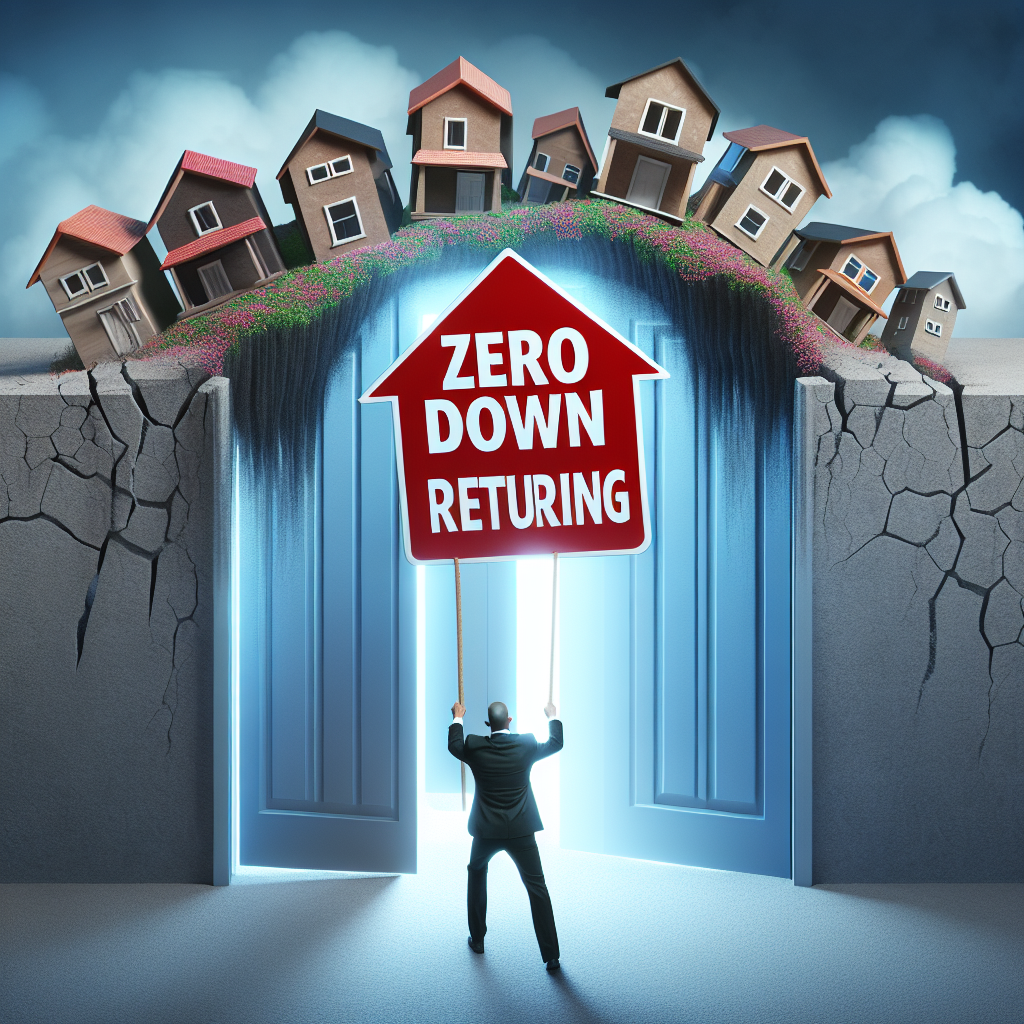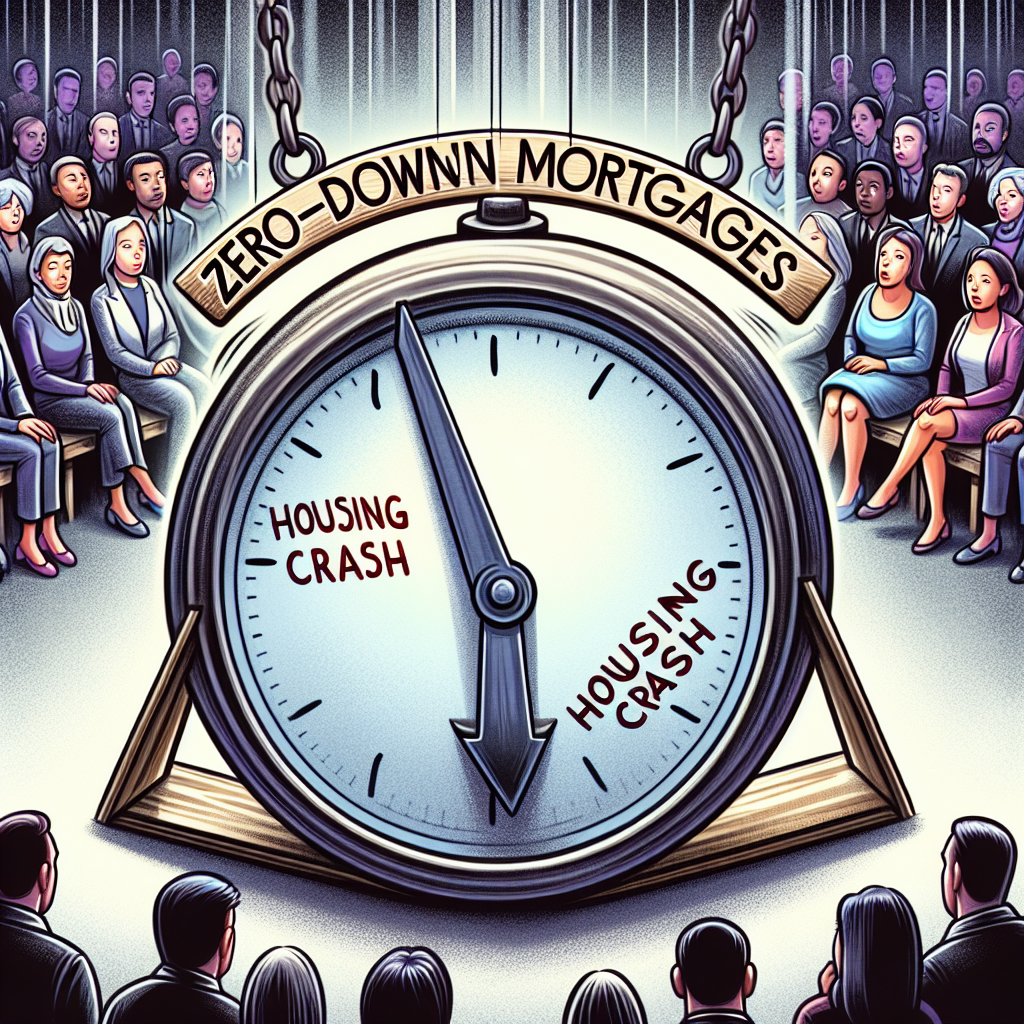-
Table of Contents
- The Return of Zero-Down Mortgages: Are We Heading for Another Housing Crash?
- Understanding Zero-Down Mortgages
- The Resurgence of Zero-Down Mortgages
- Case Studies: Zero-Down Mortgages in Action
- Case Study 1: The VA Loan Program
- Case Study 2: The FHA’s 3.5% Down Payment Program
- Case Study 3: Private Lenders and Zero-Down Mortgages
- The Risks of Zero-Down Mortgages
- Are We Heading for Another Housing Crash?
- Expert Opinions on Zero-Down Mortgages
- Strategies for Responsible Zero-Down Mortgages
- Conclusion
The Return of Zero-Down Mortgages: Are We Heading for Another Housing Crash?

In the wake of the 2008 financial crisis, the housing market experienced a seismic shift. One of the most significant changes was the disappearance of zero-down mortgages, which had been a contributing factor to the housing bubble. However, in recent years, zero-down mortgages have made a comeback, raising concerns about the potential for another housing crash. This article delves into the resurgence of zero-down mortgages, examines the factors driving their return, and evaluates whether we are on the brink of another housing crisis.
Understanding Zero-Down Mortgages
Zero-down mortgages, as the name suggests, are home loans that do not require a down payment. Traditionally, lenders have required borrowers to put down a percentage of the home’s purchase price as a down payment, typically ranging from 3% to 20%. Zero-down mortgages eliminate this requirement, allowing buyers to finance 100% of the home’s cost.
These loans can be particularly attractive to first-time homebuyers and those with limited savings. However, they also come with higher risks for both lenders and borrowers. Without a down payment, borrowers have no equity in the home from the outset, making them more vulnerable to market fluctuations and financial hardships.
The Resurgence of Zero-Down Mortgages
Several factors have contributed to the resurgence of zero-down mortgages in recent years:
- Rising Home Prices: As home prices have soared in many markets, saving for a down payment has become increasingly difficult for prospective buyers. Zero-down mortgages offer a solution for those who are otherwise financially stable but lack the necessary savings.
- Low Interest Rates: Historically low interest rates have made borrowing more affordable, encouraging lenders to offer more flexible loan options, including zero-down mortgages.
- Government Programs: Various government-backed programs, such as those offered by the Federal Housing Administration (FHA) and the Department of Veterans Affairs (VA), have made zero-down mortgages more accessible to certain groups of buyers.
- Innovative Lending Practices: Some private lenders have introduced new products and underwriting practices that allow for zero-down mortgages while attempting to mitigate the associated risks.
Case Studies: Zero-Down Mortgages in Action
To better understand the impact of zero-down mortgages, let’s examine a few case studies:
Case Study 1: The VA Loan Program
The VA loan program, administered by the Department of Veterans Affairs, offers zero-down mortgages to eligible veterans, active-duty service members, and certain members of the National Guard and Reserves. This program has been highly successful, with low default rates compared to other types of mortgages. The VA’s stringent underwriting standards and the financial stability of its borrowers contribute to this success.
Case Study 2: The FHA’s 3.5% Down Payment Program
While not a true zero-down mortgage, the FHA’s 3.5% down payment program has helped many first-time homebuyers enter the market with minimal savings. The FHA insures these loans, reducing the risk for lenders. However, the program has faced criticism for its higher default rates compared to conventional loans, highlighting the potential risks of low down payment mortgages.
Case Study 3: Private Lenders and Zero-Down Mortgages
Some private lenders have reintroduced zero-down mortgages with innovative underwriting practices. For example, certain lenders require borrowers to complete financial education courses or demonstrate a history of responsible credit use. While these measures aim to reduce risk, the long-term impact of these loans remains to be seen.
The Risks of Zero-Down Mortgages
Despite their appeal, zero-down mortgages come with significant risks:
- Increased Default Risk: Borrowers with zero-down mortgages have no initial equity in their homes, making them more likely to default if they encounter financial difficulties or if home values decline.
- Higher Interest Rates: Lenders often charge higher interest rates on zero-down mortgages to compensate for the increased risk, resulting in higher monthly payments for borrowers.
- Negative Equity: In a declining housing market, borrowers with zero-down mortgages can quickly find themselves in a negative equity situation, where they owe more on their mortgage than the home’s current value.
- Limited Financial Cushion: Without a down payment, borrowers have less financial cushion to cover unexpected expenses or emergencies, increasing their vulnerability to financial shocks.
Are We Heading for Another Housing Crash?
The return of zero-down mortgages has raised concerns about the potential for another housing crash. However, several factors differentiate the current housing market from the pre-2008 environment:
- Stricter Underwriting Standards: In the wake of the financial crisis, lenders have implemented stricter underwriting standards, including more rigorous income verification and credit checks. These measures help ensure that borrowers are more financially stable and less likely to default.
- Regulatory Oversight: Increased regulatory oversight, including the establishment of the Consumer Financial Protection Bureau (CFPB), has helped to prevent the risky lending practices that contributed to the 2008 crisis.
- Economic Conditions: The current economic environment, characterized by low unemployment and steady wage growth, is more favorable than the conditions leading up to the 2008 crash. However, economic uncertainties, such as inflation and potential interest rate hikes, could impact the housing market.
- Housing Supply and Demand: The current housing market is experiencing a supply shortage, which has driven up home prices. While this can make it more difficult for buyers to enter the market, it also reduces the risk of a sudden drop in home values.
Expert Opinions on Zero-Down Mortgages
Experts have varying opinions on the return of zero-down mortgages:
- Supporters: Proponents argue that zero-down mortgages can help address affordability issues and make homeownership more accessible to a broader range of buyers. They point to successful programs like the VA loan program as evidence that zero-down mortgages can be offered responsibly.
- Critics: Critics warn that zero-down mortgages could lead to increased default rates and financial instability, particularly if economic conditions deteriorate. They emphasize the importance of maintaining strict underwriting standards and regulatory oversight to mitigate these risks.
Strategies for Responsible Zero-Down Mortgages
To ensure that zero-down mortgages are offered responsibly and do not contribute to another housing crash, several strategies can be employed:
- Financial Education: Requiring borrowers to complete financial education courses can help ensure that they understand the responsibilities and risks associated with homeownership.
- Stringent Underwriting Standards: Maintaining strict underwriting standards, including thorough income verification and credit checks, can help ensure that borrowers are financially stable and capable of managing their mortgage payments.
- Regulatory Oversight: Continued regulatory oversight is essential to prevent risky lending practices and protect both borrowers and lenders.
- Innovative Lending Practices: Lenders can explore innovative practices, such as shared equity programs or down payment assistance, to help borrowers build equity and reduce risk.
Conclusion
The return of zero-down mortgages has sparked a debate about their potential impact on the housing market. While these loans can make homeownership more accessible, they also come with significant risks. The key to preventing another housing crash lies in responsible lending practices, stringent underwriting standards, and continued regulatory oversight. By learning from the lessons of the past and implementing these strategies, we can help ensure that zero-down mortgages contribute to a stable and sustainable housing market.
In summary, while the resurgence of zero-down mortgages raises valid concerns, the current housing market is fundamentally different from the pre-2008 environment. With careful management and responsible lending practices, it is possible to offer zero-down mortgages without repeating the mistakes of the past. The future of the housing market will depend on our ability to balance accessibility with financial stability, ensuring that homeownership remains a viable and sustainable goal for all.








